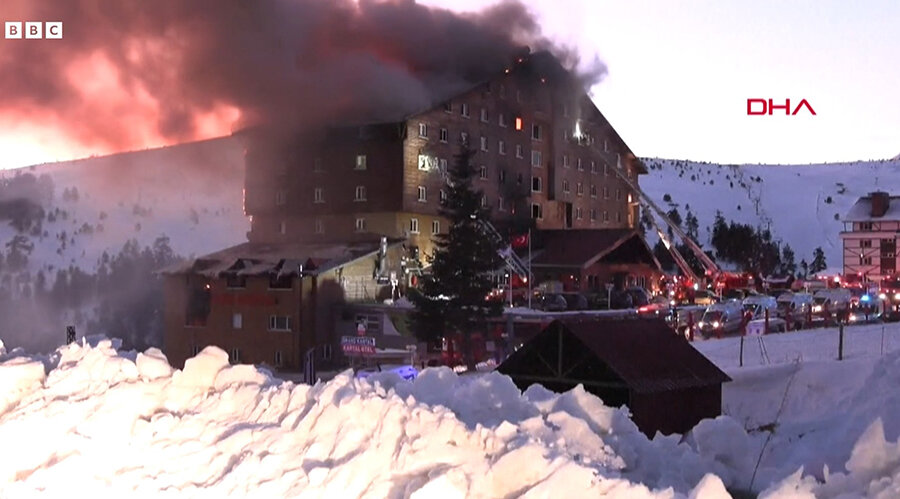News / Turkey / Real Estate / Вusiness / Tourism & hospitality / Tourism Turkey / Analytics 01.02.2025
Turkey Conducts Nationwide Hotel Inspections, Shuts Down Dozens of Properties Amid Safety Concerns

In the wake of the Grand Kartal hotel fire in the Kartalkaya ski resort, which claimed 78 lives on January 21, 2025, Turkish authorities have launched a sweeping crackdown on fire safety violations and unregistered hotel operations. The move has already led to the closure of 50 hotels in Antalya, with inspections expanding to other regions, according to Gazetememur.
The Independent reports 79 fatalities and over 50 injured guests, with 238 people registered at the hotel at the time of the disaster. Survivors recounted jumping from windows to escape the flames. The fire reportedly started at 3:27 AM in the restaurant on the fourth floor of the wooden-structured building, with firefighters arriving 45 minutes later.
Despite official claims that the hotel passed inspections in 2021 and 2024, BBC cites local mayor Tanju Özcan, who stated that the fire department had not issued a positive safety report since 2007.
Investigators Highlight Safety Failures
Experts believe that a properly functioning fire safety system should have detected the blaze within seconds and triggered an immediate evacuation.
“In well-managed hotels, someone must monitor the fire panel 24/7,”
— Kazım Beçeren, President of the Turkish Fire Protection and Education Foundation
“Fires can happen, but we don’t expect this many casualties in modern buildings. Proper evacuation routes and smoke ventilation should have made this fire survivable.”
— Prof. Şevket Özgür Atayırmaz, Fire Safety Engineer, Yıldız Technical University
Experts suspect that the hotel lacked essential fire detection, alarm, and suppression systems. The wooden facade should have been fully fire-resistant, but preliminary findings suggest it was not. Proper evacuation protocols should have ensured that all 200+ guests could be safely evacuated within 15–30 minutes under ideal conditions.
Turkey’s Union of Chambers of Turkish Engineers and Architects (TMMOB) asserts that an automatic sprinkler system was legally required for a hotel of this size. However, images from the hotel's website indicate it was never installed, despite plans dating back to 2008.
In response to the tragedy, President Recep Tayyip Erdoğan declared a national day of mourning, as the incident occurred at the height of Turkey’s winter tourism season, drawing families from Istanbul and Ankara to the Bolu ski region.
28 Arrested, Including Hotel Owner and Local Officials
By late January, 28 individuals had been detained, including regional officials, the hotel manager, and the owner, who shifted blame onto staff, including the head chef, electrician, and security guards, according to Tasnim News.
Turkish authorities are investigating whether management ignored known fire risks. A team of eight inspectors has been assigned to determine whether negligence played a role in the fire.
Nationwide Crackdown on Hotel Safety Violations
Following the disaster, Turkey’s Ministry of Culture and Tourism ordered inspections across all 81 provinces, focusing on hotels operating without valid certification.
According to NTV, 50 hotels in Antalya have already been sealed off, particularly in Kaleiçi, a popular historic district. Fire safety violations were a key focus of the inspections.
“Ensuring the safety of our tourism infrastructure is crucial—not just for people but for Turkey’s economy. We are coordinating efforts to enforce fire safety rules more strictly, hoping to prevent another tragedy.”
— Ümit Uysal, Mayor of Muratpaşa, Antalya
In Istanbul, Governor Davut Gül announced plans to shut down all unlicensed hotels immediately, stating that authorities would not delay enforcement.
Authorities are prioritizing checks on fire alarms, emergency exits, and compliance with building codes. However, hotel operators are pushing back, arguing that the strict inspections, heavy fines, and bureaucratic hurdles are putting pressure on legitimate businesses.
Implications for Turkey’s Tourism Industry
The Grand Kartal tragedy has exposed major gaps in fire safety enforcement, hotel certification oversight, and building regulation compliance. Turkey’s regulatory mechanisms are now under scrutiny, raising concerns about whether existing measures are adequate to prevent future disasters.
While initial shutdowns target clear violations, the ongoing inspections could lead to stricter regulations across the industry. It remains uncertain how many hotels will be operational before the peak summer tourism season.
For Turkey—where tourism contributes 10% to GDP—striking a balance between safety and industry stability will be critical. However, with international scrutiny mounting, Turkey’s hotel industry may be facing its biggest regulatory shake-up in decades.








